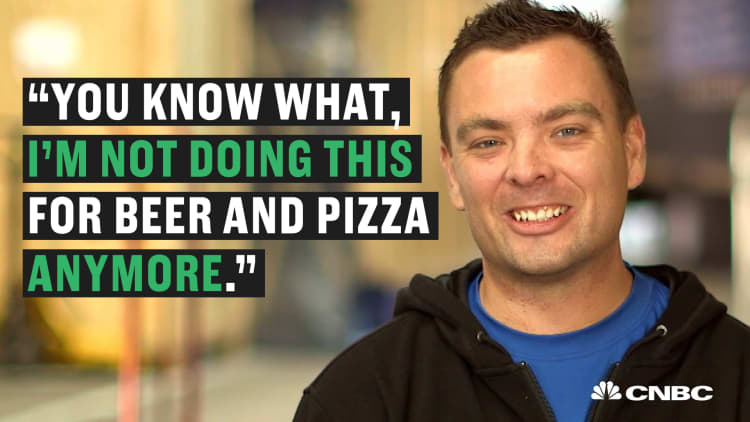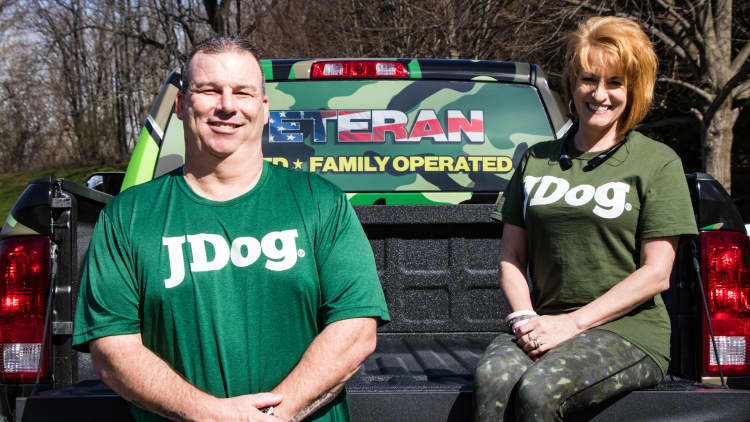In 2010, U.S. Army veteran Jerry Flanagan was at a low point.
The economy had slumped and wiped out his small business operating kids' birthday party stores.
"[My wife and I] went from having a successful retail business, to the economy crashing, to having to file bankruptcy in 2010," Flanagan, 50, tells CNBC Make It. "We literally hit rock bottom."
Guarantees they had signed on leases for their stores forced them to file for Chapter 7 personal bankruptcy, Flanagan explains.
But still determined to own his own business, Flanagan researched industries that had survived the recession and came up with hauling junk as a business. In 2011, he scraped together money to buy an old Jeep, and started his own one-man operation, which he called JDog, his nickname in the military.
Now that business is a Berwyn, Pa.-based franchiser, JDog Junk Removal & Hauling, which has 92 active franchises in 27 states. Ninety percent of the businesses are owned by veterans and the other 10 percent by veterans' family members.
For 2017, Flanagan says he estimates that all the franchises together will bring in around $18 million in junk removal sales. As a franchiser, the JDog brand collected $1.5 million in total revenue in 2017.
Flanagan attributes the success of the business to lessons he learned as a young person in the military, like the value of working hard and treating others with respect. He served in the Army from 1987 to 1989 doing electrical jobs at Ft. Stewart, Georgia. But after leaving the military, he struggled to find his purpose.
"When I got out of the Army, I attempted college, and I lasted about five months," he says. He was going to school on the GI Bill, a program that helps veterans finance their education, but says the amount he received wasn't very high at the time. "So, I ran out of money. I went ahead and did multiple minimum-wage jobs." He worked as a bouncer, a dishwasher and at a gas station.
"Those were my three go-to's, all at the same time, basically just to make ends meet until I figured out what I wanted to do in life," he says.
That started to become clear after he got a job loading trucks and sweeping floors at a store called Halloween Adventure. He rose through the ranks to store manager, then district manager and eventually to facility operations manager, where he learned about marketing and leasing. Then, he decided he wanted to go into business for himself.
"I felt that I had the work ethic," he explains. "Why not get paid for my own efforts instead of making someone else rich?"
With financial backing from a partner, he opened his retail business and ran it for three years, until it succumbed to the aftermath of the recession.
That business's demise eventually led to JDog, but it wasn't easy.
At "44 years old, starting from scratch again on something you've never done before without any college education is a pretty scary situation. Especially when my two daughters were getting ready to start high school," says Flanagan, who was afraid he could lose it all again.
"My wife and I would go buy packs of white index cards, and we would hand write in magic marker 'Jdog Junk Removal: neighborhood junk removal service, call Jerry' with my number," he explains. "I put it at the pizza shop right in my development, and that is how I got my first [junk-hauling] job."
That first Jeep he used to cart away customers' junk had 80,000 miles on it and was 10 years old. "The transmission dropped out of it in my third month of business. It wasn't funny at the time, but it is funny now," he says.
But, as he did more jobs for people in his neighborhood, he noticed that he had an edge on competitors.
"I realized that my background in the military stayed with me. When you say 'Yes, sir' and 'Yes, ma'am' to a customer, you're on time, you show respect, integrity and trust, it makes a big difference," he explains. "I got a reputation in my neighborhood that if you want a junk removal service or something hauled away, you need to call this military guy."
Although he had his nephew and some friends occasionally helping out, the amount of work started to grow to three or four jobs a day, beyond what he could handle.
"I needed employees," he explains. "I wanted to hire a veteran to work with me because our brand was a veteran-owned business."
So Flanagan's first stop was the Coatesville, Pennsylvania, Veterans Affairs Medical Center to try to find any vets that needed work. There he learned about the Veterans Health Administration's Compensated Work Therapy program, which helps veterans living with mental illness or physical impairment find jobs.
In 2012, when Flanagan started hiring, the unemployment rate for veterans who served on active duty after September 2001 was 9.9 percent, according to the Bureau of Labor Statistics. In 2016, that number was 5.1 percent, the BLS reported.
Through the Veterans Affairs program, Flanagan found one of his first employees — a U.S. Army veteran who had served overseas in Iraq. Flanagan said the experience working for JDog helped the man acclimate to life as a civilian.
"You're doing six jobs in a day, and you're lifting things and people are tipping you and paying you and putting their arms around you, for not only doing a great job in their home, but for your military service," he says. "I think that really resonated."
For Flanagan, that was eye-opening.
"It led me to my purpose," he says. "It made me feel like, wow, I just potentially have changed this guy's life."
He hired more veterans, and in 2014, the business also took on outside investment from Julip Run Capital, allowing Flanagan to scale the business as a franchise, selling locations only to service members and their families. The estimated initial investment costs to buy a JDog franchise amount to between $45,100 and $95,000, according to the company. There is no real estate or storefront required; franchisees just need a truck and trailer.
JDog also has a national agreement with the Veterans Health Administration to help veterans get jobs at the company through the Compensated Work Therapy program across the country.
For Andrew Weins, a U.S. Army Reserve veteran who completed two tours, buying JDog franchises has been a success: From Nov. 1, 2016, through Oct. 31, 2017, the most successful of his three franchises, one in Menomonee Falls, Wis., did over $750,000 in sales. He has 22 employees and 11 trucks.
According to a survey of franchise owners published in JDog's 2017 franchise disclosures, on the high end, owners who had been in business over a year reported making an average of almost $30,000 per month in gross revenue. That means those high performing franchisees are looking at roughly $360,000 in gross revenue per year, putting Weins well above average.
Although starting another business was a risk after his retail company failed, Flanagan, who now leads the company as the CEO, says he'd do it again.
"To me, I would keep taking chances," he says. "If you believe that you can get up earlier than everybody else, and work later than everybody else and work harder than everybody else, eventually you're going to get it."
Don't miss: The 10 best universities for veterans
Like this story? Like CNBC Make It on Facebook




